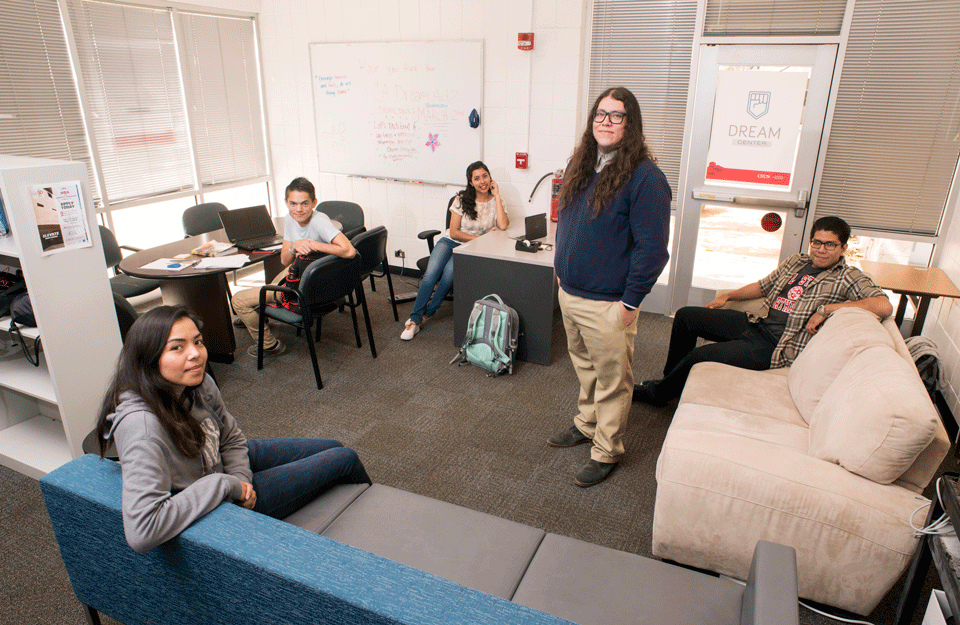CSUN Builds DREAM Center to Serve Undocumented Students
Most students attending California State University, Northridge come to campus with big dreams. For undocumented students, it always has been difficult to pursue theirs. To help make dreams come true, CSUN has opened a resource space for undocumented students called the DREAM center at the University Student Union (USU).
In 2015, CSUN established a support system with the campus known as the DREAM (Dreamers, Resources, Empowerment, Advocacy and Mentorship) Project, to smooth the path for undocumented students, who face a myriad of obstacles on their way to earning a college degree. The project came to life through CSUN’s student organization Dreams to be Heard, a support group for AB 540 and undocumented students.
AB540 is a California State Assembly bill passed in 2001, exempting undocumented students from nonresident tuition if they fulfill certain requirements. In 2013, Dreams to be Heard began raising awareness by highlighting the need for a centralized resource space for undocumented students. In 2014, Dreams to be Heard began working with administration, faculty and students to create the DREAM Project, culminating with the launch of the centralized resource space launched in January 2015.
“We’re aiming to do what that acronym entails,” said Dario Fernandez, DREAM Project coordinator. “We’re trying to reach undocumented and AB 540 students, give them the resources they need to be able to focus on being a student — and not so much on their status — and really empower them to become advocates for their own education.”
Funded by the Campus Quality Fee, the newly expanded DREAM Center aims to provide undocumented students with resources, leadership experiences, professional development and networking opportunities.
“CSUN has the largest number of undocumented students in the whole UC and CSU system,” Fernandez said. “We serve 450 students [at the center], but we estimate that there are about 1,400 [undocumented] students at CSUN.”
With the large number of students reaching out to the DREAM Project, its initial small office in Santa Susanna Hall wasn’t sufficient for the growing organization. In December 2015, the CSUN administration approved the transition to the DREAM Center, a bigger and brighter space in the USU, next to the Reservation and Events Services office.
“One thing that makes the shift from the old office to the new office more significant is that you see more legitimacy in a room of this size,” said Alvaro Castillo, communications coordinator for the DREAM Center. “And the location is great. The USU is one of the most active areas in the university. It brings more light and more awareness to the center and to the students who are served.”
Most students contact the DREAM Project for help with financial aid concerns, information on how their status affects their studies, internships or employment.
“For a lot of our students, internships are really hard to come by because of their immigration status,” said Angel Silva, policy literacy coordinator for the DREAM Center. “We help them to find work [at CSUN], but we also help them to seek external internships.”
Including Fernandez, Castillo and Silva, the center’s student team consists of eight members — all students from different majors, helping one another in the development of the DREAM Project, with different areas of expertise.
Carla Martinez, a junior in Deaf Studies, is dedicated to supporting the Deaf undocumented student community and to helping them find the right resources. Childhood and adolescent development sophomore Teresa Gonzalez and psychology senior Rosa Salamanca are currently developing a mentoring program.
“We want them to be comfortable coming to the space,” Gonzalez said. “We want to get to know them on a personal level, give them advice, let them know that there are individuals who are in a similar situation and that it is OK to be open about it.”
Fernandez said the issue of undocumented status is not often discussed, making it difficult to reach out to students in the different communities where being undocumented is a taboo topic.
“We want them to know that we’re in a space that’s accessible to them,” he said. “Everybody is welcome — both undocumented and allies.”
For more information, visit the new DREAM Center in the University Student Union Building C.


 experience
experience